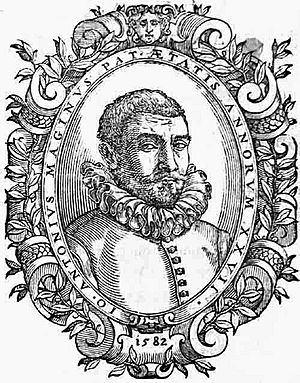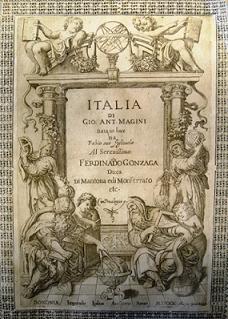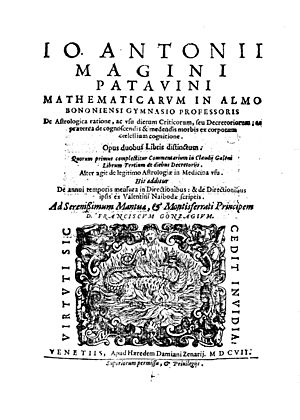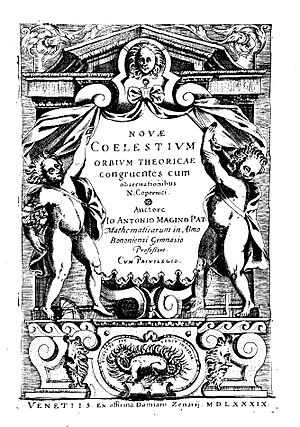Giovanni Antonio Magini facts for kids
Quick facts for kids
Giovanni Antonio Magini
|
|
|---|---|

Giovanni Antonio Magini, Italian mathematician
|
|
| Born | 13 June 1555 Padua, Republic of Venice |
| Died | 11 February 1617 Bologna, Papal States |
| Occupation | Astronomer, mathematician, astrologer |
| Employer |
|
Giovanni Antonio Magini (also known as Maginus in Latin) was an important Italian scientist. He was born on June 13, 1555, and passed away on February 11, 1617. He was an expert in many fields, including astronomy, cartography (map-making), and mathematics.
Contents
Early Life and Education
Giovanni Antonio Magini was born in Padua, a city in Italy. His father was Pasquale Magini. Giovanni finished his studies in philosophy in Bologna in 1579.
He became very interested in astronomy. In 1582, he wrote a book about the movements of the sky. It was called Ephemerides coelestium motuum. The next year, it was translated into Italian.
In 1588, Magini was chosen for a special job. He became the professor of mathematics at the University of Bologna. He got this job after another professor, Egnatio Danti, died. Magini was chosen over the famous scientist Galileo Galilei for this position. He lived and worked in Bologna until he died.
Magini's Scientific Contributions
Magini made many important contributions to science. He worked on understanding the universe, creating maps, and developing new mathematical tools.
Understanding the Universe
Magini had his own ideas about how the universe worked. At the time, many scientists were debating two main ideas. One was the geocentric model, which said Earth was the center of the universe. The other was the heliocentric model by Nicolaus Copernicus, which said the Sun was the center. Magini believed in the geocentric system, where Earth was at the center.
He even created his own theory about how the planets moved. It was different from other theories of his time. Magini's system had eleven spinning spheres. He described this idea in his book Novæ cœlestium orbium theoricæ congruentes cum observationibus N. Copernici, published in 1589.
Mathematics and Tools
Magini was also a skilled mathematician. In 1592, he published a book called De Planis Triangulis. In this book, he explained how to use quadrants. Quadrants were tools used for surveying land and for observing stars in astronomy.
In 1592, Magini also published Tabula tetragonica. Later, in 1606, he created very accurate trigonometric tables. These tables helped people calculate angles and distances. He also studied the geometry of spheres and how to use trigonometry in practical ways. For this, he invented special calculating devices. He also studied mirrors and wrote about how concave spherical mirrors work.
Mapping Italy
One of Magini's biggest projects was creating a detailed map of Italy. This huge work was called Italia or the Atlante geografico d'Italia (Geographic Atlas of Italy). He started working on it in 1594. His goal was to include maps of every region in Italy. These maps would have exact names for places and historical notes.
This project was very expensive. To pay for it, Magini took on extra jobs. For example, he became a math tutor for the sons of Vincenzo I of Gonzaga. Vincenzo was the Duke of Mantua and a big supporter of arts and sciences. The Duke helped Magini with his atlas project. He even allowed Magini to get maps from different Italian states. The governments of Messina and Genoa also gave Magini money for this work. Magini himself did not draw the maps. Instead, he collected and organized information from others.
Sadly, Magini died before the atlas was fully printed. His son published it after his death in 1620.
Connections with Other Scientists
Giovanni Antonio Magini kept in touch with many other important scientists of his time. He wrote letters to famous people like Tycho Brahe, Clavius, Abraham Ortelius, and Johannes Kepler. These letters helped scientists share their ideas and discoveries.
Legacy
Today, a lunar crater on the Moon is named Maginus in his honor. This shows how important his work in astronomy was.
Works
Images for kids
See also
 In Spanish: Giovanni Antonio Magini para niños
In Spanish: Giovanni Antonio Magini para niños
 | Charles R. Drew |
 | Benjamin Banneker |
 | Jane C. Wright |
 | Roger Arliner Young |







